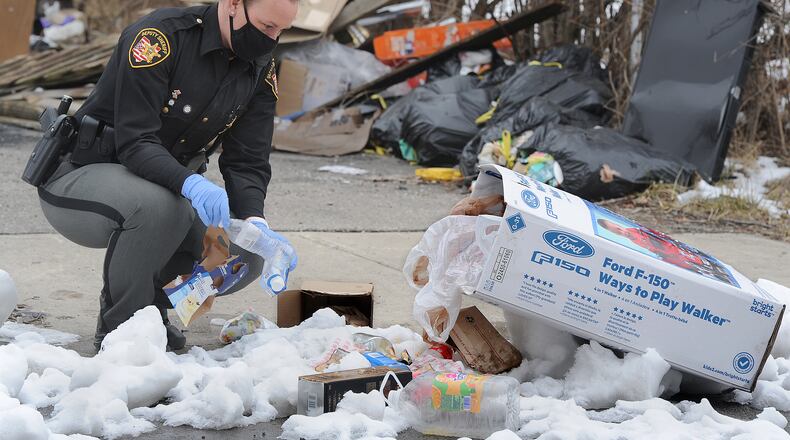“There was a lot of people were working at home. There was a lot of home improvement projects, people cleaning out their attics, their garages and such. We saw some of our record days, serving 1,800, 1,900 customers in a day,” said Bob Downing, the county’s Environmental Services assistant director.
The Montgomery County Environmental Crimes Task Force conducted 108 investigations into illegal dumping last year, which was a 37% increase over 2019. The increase, however, is due to the time put into investigations by a second sheriff’s deputy who normally supervises inmate litter crews. That activity is currently suspended due to the pandemic.
Prosecutions and convictions from illegal dumping remained about the same in 2020 as in the previous year, according to the task force. The investigations yielded 40 prosecutions and 28 convictions.
“We haven’t seen an uptick, but we haven’t seen a downtick, either,” said Chris Hoffman, the task force’s program coordinator and executive director of Keep Montgomery County Beautiful.
The task force noted a shift beginning last summer in the kind of items being illegally dumped, said Montgomery County Sheriff’s Deputy Robbie Jackson.
“There’s more household trash — more couches, furniture, dressers, stuff like that,” she said.
More mattresses have also been dumped in recent months as trash that appeared to be generated from commercial sources waned, said Jackson, the county’s environmental enforcement deputy.
Most illegal dumping in Montgomery County is in Dayton, Harrison Twp., Jefferson Twp. and Trotwood, Hoffman said. Those four jurisdictions are partner agencies in the task force along with the Montgomery County Sheriff’s Office, Montgomery County Environmental Services, the Montgomery County Prosecutor’s Office, Public Health – Dayton & Montgomery County and the Ohio Environmental Protection Agency.
A majority of the convictions are the result of surveillance cameras placed at known dumping grounds, which can range from dead-end streets to the vacant house next door, Jackson said. It’s not uncommon for the county and its jurisdictions to have multiple sites under surveillance at any given time, she said.
The charge for illegal dumping, called restrictions on depositing litter, is a crime against society. Littering may result in a third-degree misdemeanor conviction punishable by up to 60 days in jail and a fine up to $500, according to the Ohio Revised Code.
Dumping hazardous and solid wastes, including tires, can be prosecuted as a felony offense. Open dumping is punishable by a fine up to $25,000 and a jail sentence of two to four years, according to Ohio code.
Since its inception in 2013, the Montgomery County Environmental Crimes Task Force helped secure convictions in 39% of the 654 cases it investigated.
A county agreement with the Sheriff’s Office for the two task force deputies runs through 2022. The estimated 2021 contract is $254,550.
The Environmental Crimes Task Force enforcement officer investigates criminal offenses and performs annual tire shop inspections. In normal times, the litter control deputy supervises crews of four to six inmates that clean up debris on more than 250 county roads in all 28 municipalities. In 2019, inmate crews clocked 4,902 hours and collected 132,860 pounds of roadside litter, according to task force records.
The county may be starting 2021 with more illegal dumping than last year because of January’s relatively warmer temperatures, Jackson said.
“Normally about now it usually dies down just a little bit. But it’s not,” she said.
Hoffman said illegal dumping can take a toll on neighborhoods, bringing down resale values and wrecking the quality of life. But residents can help.
“If you see something, say something,” he said. “The camera programs are great, but if you’re a resident and you have illegal dumping activity in your neighborhood, the best way for us to investigate and put an end to it is by people who are willing to testify and people who are willing to work with deputies to prosecute those folks.”
Where to legally dispose of trash in Montgomery County
Montgomery County Solid Waste District Transfer and Recycling Facility
1001 Encrete Lane, Moraine
Monday – Friday, 6 a.m. to 8 p.m.,
Saturday, 8 a.m. to 3 p.m.
Closed Sundays and certain holidays
For questions, contact the Montgomery County Solid Waste District at 937-225-4999 from 8 a.m. to 4 p.m. Monday through Friday.
Where to report illegal dumping
Montgomery County Environmental Crimes Task Force, 937-225-HELP (4357)
City of Dayton website, www.daytonohio.gov
City of Dayton Call Center, 937-333-4800—
Dayton Delivers mobile app, under Housing and Neighborhoods—
About the Author

